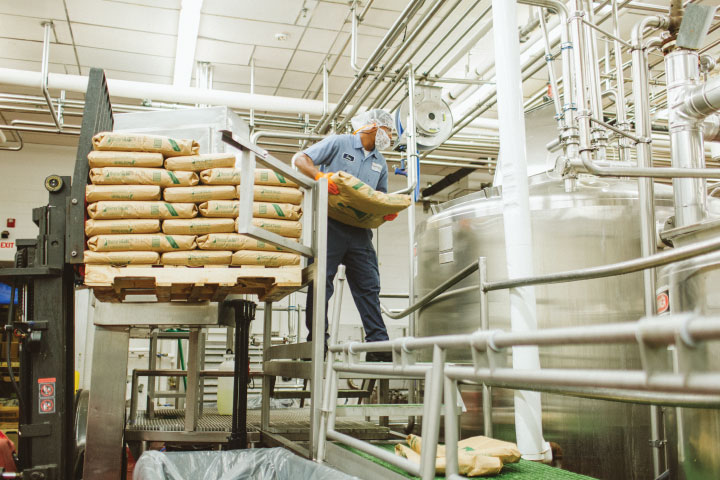In today's conscientious customer landscape, the need for morally sourced and also sustainable items has actually risen. Private label food manufacturers have Food trends research Australia emerged as pioneers in this domain, often teaming up with agreement food makers to spearhead sustainability and also accountable sourcing initiatives. With a resolute dedication to environmental ethics, exclusive label brand names have made it their goal to deliver sustainable, high-quality alternatives to consumers.
Private Label Food Manufacturers
In the last few years, private label food manufacturers, additionally called very own brands or shop brand names, have actually witnessed an impressive rise in appeal. These manufacturers create goods sold under the logo design of a store, grocer, or exclusive entity. What sets private-label products apart is their capability to offer competitive rates without compromising on high quality.
Contract Food Manufacturers
Several private-label food manufacturers join forces with contract manufacturers to establish their product. Contract food makers are professionals in generating foodstuff for exclusive labels. This critical collaboration enables personal label companies to take advantage of the knowledge, sources, and devoted food manufacturing centers of their partners.
Sustainability at the Core
Private label food manufacturers use numerous approaches to boost sustainability within their supply networks:
Moral Sourcing:
Personal label companies are progressively devoted to sourcing components according to ethical and reasonable trade standards. This requires guaranteeing that manufacturers and workers of resources, such as coffee beans, spices, or cacao, obtain fair payment for their efforts.
Local Sourcing:
Prioritizing local sourcing of ingredients is an additional trademark of private-label food manufacturers. This not just decreases the carbon impact associated with transport however additionally supports neighborhood farmers and communities.
Organic Ingredients:
With the organic food market increasing, exclusive labels are responding by integrating natural components into their product lines. Organic farming techniques focus on soil health while avoiding synthetic chemicals and also plant foods.
Lasting Fish and shellfish:
Private Label Food Manufacturers are attentive in making sure that the fish and shellfish they utilize is sustainably harvested, adhering to standards established by organizations like the Marine Stewardship Council, which advertises responsible fishing.
Lowered Food Waste:

Exclusive label companies are proactively working on minimizing food waste by executing effective manufacturing procedures as well as creating items with longer life span. Some brand names are likewise partnering with food rescue organizations to donate excess food to those in requirement.
Eco-Friendly Packaging and also Efforts
Sustainability initiatives by private-label food producers prolong past sourcing ingredients to incorporate product packaging and eco-friendly campaigns:
Lasting Product packaging:
Exclusive label brands have welcomed environment-friendly product packaging alternatives, consisting of recyclable, naturally degradable, or compostable materials. Upgrading product packaging to lessen excess product and decrease environmental influence is a leading concern.
Waste Decrease:
To decrease wastage, private-label food suppliers optimize item sizes, minimize excess product packaging, and also discover cutting-edge packaging solutions. Some brand names even motivate customers to take part in reusing programs.
Energy Efficiency:
Many exclusive label manufacturers are investing in more energy-efficient production plants, reducing water usage, and taking on renewable energy sources to further decrease their environmental footprint.
Carbon Neutral Initiatives:
Some private brand name food makers are taking ambitious steps to achieve carbon neutrality by countering their greenhouse gas discharges through reforestation jobs and renewable energy credit reports.
Challenges as well as the Roadway Ahead
In spite of the substantial strides made in sustainability and responsible sourcing, private-label food manufacturers encounter obstacles. Stabilizing sustainability with cost-effectiveness can be a fragile act, sometimes requiring compromises on sustainable components or the exploration of green options.
Nevertheless, the future of private-label food manufacturing holds excellent guarantee. As customer understanding and demand for sustainable products remain to climb, private-label brand names and also their contract food manufacturing partners are likely to escalate their efforts. Partnership with providers and investment in lasting technical breakthroughs as well as transparency will certainly be critical fit a lasting future for the market.
Frequently Asked Questions
Q1: What are private label food manufacturers?
Private label food manufacturers generate products offered under the logo design of a retail store, grocer, or exclusive entity. They use competitively valued products without endangering on high quality.
Q2: Exactly how do private label food manufacturers advertise sustainability?
Private label food manufacturers advertise sustainability with honest sourcing, regional active ingredient procurement, using natural components, sustainable seafood practices, as well as initiatives to minimize food waste.
Q3: What eco-friendly packaging choices do exclusive label brands use?
Private label brand names take on environment-friendly packaging options such as recyclable, eco-friendly, or compostable materials. They also redesign packaging to reduce excess product and also lower environmental influence.
Q4: What tests do private label food manufacturers face in sustainability efforts?
Balancing sustainability with cost-effectiveness is a major difficulty for private label food manufacturers. This may call for concessions on lasting components or the exploration of environment-friendly choices.
Conclusion
Private label food manufacturers go to the leading edge of the sustainability and also accountable sourcing movement within the food market. Their dedication to ethical sourcing, local procurement, organic components, as well as lasting techniques, in addition to their commitment to environmentally friendly packaging and also waste decrease efforts, demonstrate their resolution to fulfill the needs these days's eco-conscious consumers.
